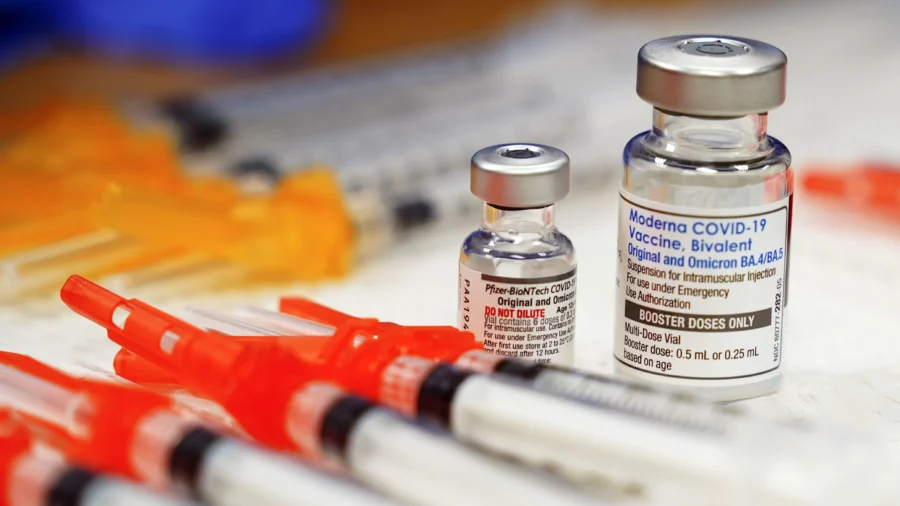Updated COVID-19 vaccines did not confer any protection upon people who were already vaccinated and had a history of infection, according to a new study.
Vaccinated people who took one of the shots actually saw a slight decrease in protection against infection, researchers in Japan found.
They compared people who had received at least two doses of the original Pfizer and Moderna vaccines to people who received a bivalent shot on top of at least two doses of the originals.
“We did not find sufficient evidence of the effectiveness of bivalent vaccines among previously infected older adults,” the researchers, with the Department of Health Care Administration and Management at Kyushu University and other institutions, said.
The paper was published following peer review in BMC Infectious Diseases.
The corresponding author for the study did not respond to a request for comment.
“I would interpret the study to mean that in those without previous infection a booster vaccination is more important and valuable [than] in those with previous infection where the impact may be smaller or non-existent,” Dr. Jeffrey Klausner, clinical professor of medicine, population and public health sciences at the University of Southern California’s Keck School of Medicine, told The Epoch Times via email.
In vaccinated people without prior infection, the study estimated a bivalent booster added 18.6 percent protection against infection.
When stratifying by time among the entire study population, researchers estimated a bivalent booster initially added 0.6 percent protection. The added protection peaked at 26.5 percent protection and dropped to 21.7 percent protection after 34 days.
Limitations of the paper included not examining the long-term protection from the bivalent vaccines. Funding came from the Japan Agency for Medical Research and Development and the Japan Society for the Promotion of Science. Authors declared no conflicts of interest.
The bivalent vaccines were available in the United States, Japan, and some other countries from the fall of 2022 to the fall of 2023. They were introduced, without clinical trial data, because the original vaccines stopped performing as well against emerging variants of the virus that causes COVID-19.
The shots were widely recommended in the United States.
The bivalent vaccines have since been replaced by new monovalent shots that target the XBB.1.5 virus subvariant, although that strain has since been displaced in many places.
In Japan, the new shots are available to the population but authorities are only recommending them to the elderly and people with underlying health problems.
In the United States, officials recommend the new shots for virtually every person aged 6 months or older, regardless of whether they’ve been infected before. Just 22 percent of adults and 11 percent of children have received one of the new shots, according to the U.S. Centers for Disease Control and Prevention (CDC).
“We do need nuance in our vaccine recommendations—vaccination has less benefit in younger people, those generally healthy, and in those recovered from infection,” said Dr. Klausner, who was not involved in the research. “Vaccine efforts should be targeted to those most at risk of complications and severe disease like the elderly, those with chronic medical conditions or immunocompromise or in either of those groups without prior infection.”
Japan used two versions of the bivalent shots, one targeting the BA.1 subvariant and another based on the BA.4/Ba.5 sublineages. The United States only used the version that targeted the latter.
Other New Studies
Several other new papers have focused on the bivalent vaccines, including one from South Korea.
Researchers there reported that BA.1 bivalent shot recipients with previous infection actually did worse against protection, with adjusted effectiveness pegged at negative 77 percent. For vaccinated people who had a prior infection and received the other bivalent shot, the protection was estimated at 59 percent.
Among vaccinated people who did not have prior infection, protection for both versions was estimated to be about 35 percent.
“The BA.1-based bivalent vaccine was effective only in individuals without prior SARS-CoV-2 infection,” the researchers said.
The study’s limitations included a lack of stratification by vaccine manufacturer, funding came from the Korea University College of Medicine, and no disclosures were listed.
European researchers, in another paper, estimated that bivalent vaccines provided strong protection against severe illness initially but that the shielding dropped to near-zero over time.
The researchers examined records of adults aged 60 or older who experienced severe acute respiratory infection between February and August 2023. They estimated vaccine effectiveness started at 80 percent against the infection but dropped to 0 percent beyond 269 days.
The researchers did not adjust for prior infection, a fact they listed as one of the limitations of the paper. Funding came from the European Centre for Disease Prevention and Control. Declared conflicts included sponsorship from Pfizer for one author and payments from Pfizer for another.
From The Epoch Times


